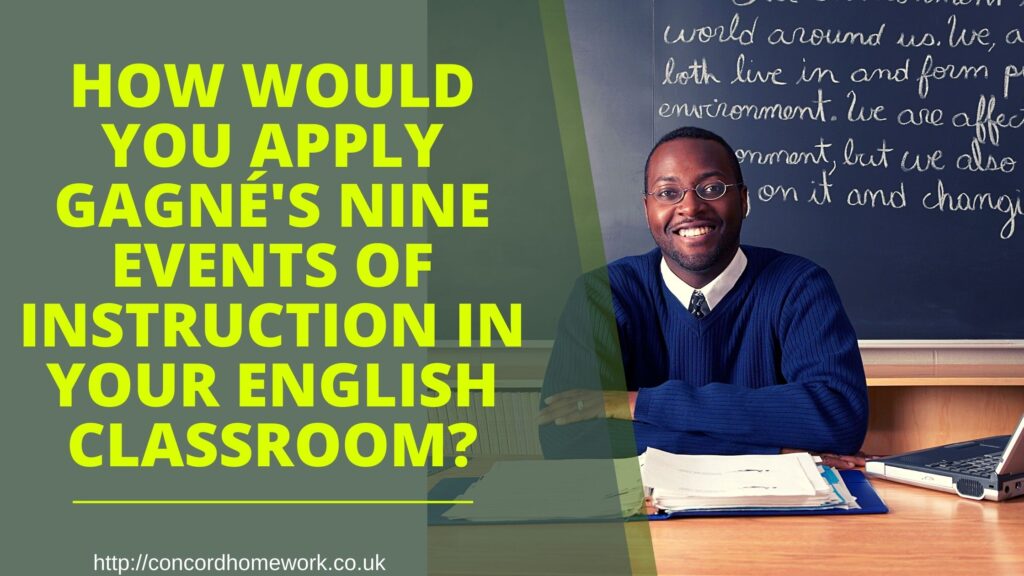Isn’t it time to take your teaching to the next level?
How to apply Gagne’s nine events of instruction?
In this post, I’ll share with you an example on how to apply Gagne’s nine events of instruction using an example of writing skills. You can use Gagne’s nine events of instruction to design your lessons.
History of Gagne’s Nine Events of Instruction
A Little History About These Nine Events 55 years ago, Robert Gagné published the first edition of his book The Conditions of Learning (1965) in which he proposed nine events of instruction that provide a sequence for organizing a lesson.
These events remain the foundation of current instructional design practice, represent desirable conditions in an instructional program, and increase the probability of successful learner achievement in the program.
The origin of These Nine Events is from the cognitive learning process in which the mind is described as a computer. For example, when you input data in a computer keyboard (or sensory registers), it goes temporarily into the RAM (or working memory which capacity is limited) then moved to the hard drive (or long-term memory). This process is known as encoding information. Now, whenever you need a specific kind of information you can collect it from your hard drive or long-term memory. This process is known as retrieval.
In short, the cognitive learning process emphasizes both the encoding and retrieval processes.
Foundations of Instruction
Basically, these events represent instruction because Gagné defined instruction as a set of events external to the learner designed to support the internal learning process.
In simple terms, instruction refers to various stages or events the learner goes through during a lesson with the sole purpose of facilitating the process of learning.
The importance of these events
If the teacher fails to use these events during a lesson, he or she will be involved in providing information instead of instruction. In addition, these events may also apply in self-instruction when the learner learns from a book or a computer. At the end of this post, you will be able to design a lesson based on Gagne’s nine events of instruction.
So, let’s discover these nine events of instruction by using this scenario. Imagine that you want to teach your students how to write a paragraph and you intend for them to master the processes of doing it besides you are also planning to assess their writing.
Use Gagne’s nine events of instruction to design your lesson.
Event 1: Gaining Attention.
In this stage, the focus is on appealing to the learner’s interest or curiosity. For example, you may tell a story to your students about the day you wrote your first paragraph, how you felt about it, what you did and how it went.
Event 2: Informing learner of the objective.
Here, we refer to the performance objectives. For example, you may say “Dear students, today I will teach you how to write a paragraph in 5 steps.”
Event 3: Stimulating recall of prerequisite learning.
Here, you may ask a recognition or recall question to the learner. For example, you may ask them “what kind of sentences or chunks we may need to write a paragraph?”
Event 4: Presenting the stimulus material.
Here, the focus is on communicating or presenting the instructional message and providing a variety of examples.
For example, you may demonstrate to your students how to write a paragraph by using the following 10 steps:
Step 1: Write an outline of the paragraph and make sure to add the topic sentence and supporting information.
Step 2: Create the topic sentence.
Step 3: Write supporting sentences.
Step 4: Write a concluding sentence.
Step 5: Write the complete final paragraph.
Event 5: Providing learning guidance.
Here, we refer to providing hints to students. For example, while demonstrating how to write a paragraph, you may ask your students whether the topic sentence should be written at the beginning of the paragraph or at the end? Wait for his answer and tell them the most preferred method.
Event 6: Eliciting the performance.
This stage requires learners to show what they have learned. It is also known as the “show me” or “do it” event. For example, you may tell your students to help you write another paragraph the following day in which they will guide you by explaining the steps.
Event 7: Providing feedback about performance correctness.
Here, the teacher provides information to learners about the correctness of their performance. For example, you may provide constructive feedback about your students’ paragraphs by saying that: “you have used the tenses correctly but had some issues with spelling and misuse of language” your errors in spelling were a little bit too much but, good job for trying!”
Event 8: Assessing the performance.
The purpose of this stage is to evaluate whether performance reflects the objectives. For example, let your students write a paragraph every day/twice a week and share your feedback with them about their performance.
Event 9: Enhancing retention and transfer.
Here, the focus in on variety and novelty. You want to apply what you learned in a different setting. For example, you may ask your students whether they will feel comfortable writing a letter when they go to college.
There you have it. Use this example in any lesson or any subject when teaching. I look forward to hearing your comments.
“Thank you for taking the time to explore this topic with us! We hope you found the information helpful and insightful. Have any thoughts, questions, or additional examples to share? We’d love to hear from you in the comments below!
Don’t forget to spread the word by sharing this blog with your friends, family, and colleagues. Together, let’s continue to learn, grow, and connect with the world around us. Happy reading and sharing!”
Follow Me On TikTok:
Follow me!????????????????
Follow me on YouTube:
Subscribe!????????????????
What topics/worksheets do you need? Let me know in the comments below!

